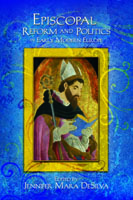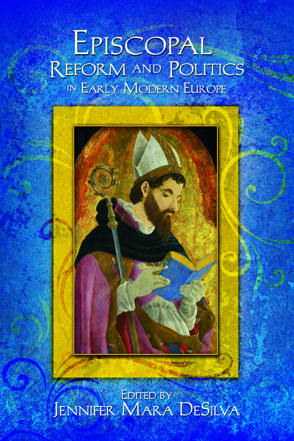Episcopal Reform and Politics in Early Modern Europe
Edited by Jennifer Mara DeSilva
“This volume of essays, all of which are based on original research, is quite distinctive in the way it presents the development of episcopacy in the age of the tridentine reformation. By presenting Europe’s bishops—from England to Italy—in their many roles, it shows just how difficult it was to reform such powerful figures. The essays unobtrusively introduce readers to the historiographies of several European countries, and thereby achieve a comprehensiveness that will encourage further reflection and, above all, further research on a major historical subject.”
- Description
- Reviews
- Bio
- Table of Contents
Contributors include: William V. Hudon, Jennifer Mara DeSilva, Raymond A. Powell, Hans Cools, Antonella Perin, John Alexander, John Christopoulos, Jill Fehleison, Linda Lierheimer, Celeste McNamara, Jean-Pascal Gay
“This volume of essays, all of which are based on original research, is quite distinctive in the way it presents the development of episcopacy in the age of the tridentine reformation. By presenting Europe’s bishops—from England to Italy—in their many roles, it shows just how difficult it was to reform such powerful figures. The essays unobtrusively introduce readers to the historiographies of several European countries, and thereby achieve a comprehensiveness that will encourage further reflection and, above all, further research on a major historical subject.”
“Historians specializing in religion and the church in early modern Europe explore the crisis and reform involving Catholic bishops during the 16th and 17th centuries.”
“This volume is well worth the attention of a broad range of church historians and historians of religious culture. It examines crucial issues about religious authority and its exercises, issues that may have some interesting parallels today.”
Jennifer Mara DeSilva completed a PhD in history at the University of Toronto, where she examined the role of papal ritual and the Office of Ceremonies in early modern Italy. Her published research includes articles that focus on the intersection of public display, diplomacy, social mobility, and ecclesiastical authority. Currently she is assistant professor of history at Ball State University.
Foreword: The Local Nature of Episcopal Reform in the Age of the Council of Trent—William V. Hudon
Introduction: A Living Example—Jennifer Mara DeSilva
Part 1: Episcopal Authority
A Hierarchy that Had Fought Episcopal Promotion during the Reign of Mary I (1553–58) and the Roots of Episcopal Resistance to the Elizabethan Religious Settlement—Raymond A. Powell
Bishops in the Habsburg Netherlands on the Eve of the Catholic Renewal, 1515–59—Hans Cools
Office and Patronage in Mid-Sixteenth-Century Tortona—Antonella Perin and John Alexander
Part 2: Pastoral Practice
The Absentee Bishop in Residence Paris de’ Grassi, Bishop of Pesaro, 1513–28—Jennifer Mara DeSilva
Papal Authority, Episcopal Reservation, and Abortion in Sixteenth-Century Italy—John Christopoulos
Ministering to Catholics and Protestants Alike: The Preaching, Polemics, and Pastoral Care of François de Sales—Jill Fehleison
Part 3: Clerical Reform
Gender, Resistance, and the Limits of Episcopal Authority: Sébastien Zamet’s Relationships with Nuns, 1615–55—Linda Lierheimer
Challenges to Episcopal Authority in Seventeenth-Century Padua—Celeste McNamara
Trials that Should Have Been: The Question of Judicial Jurisdiction over French Bishops in the Seventeenth Century and the Self-Narration of the Roman Inquisition—Jean-Pascal Gay
Mailing List
Subscribe to our mailing list and be notified about new titles, journals and catalogs.




